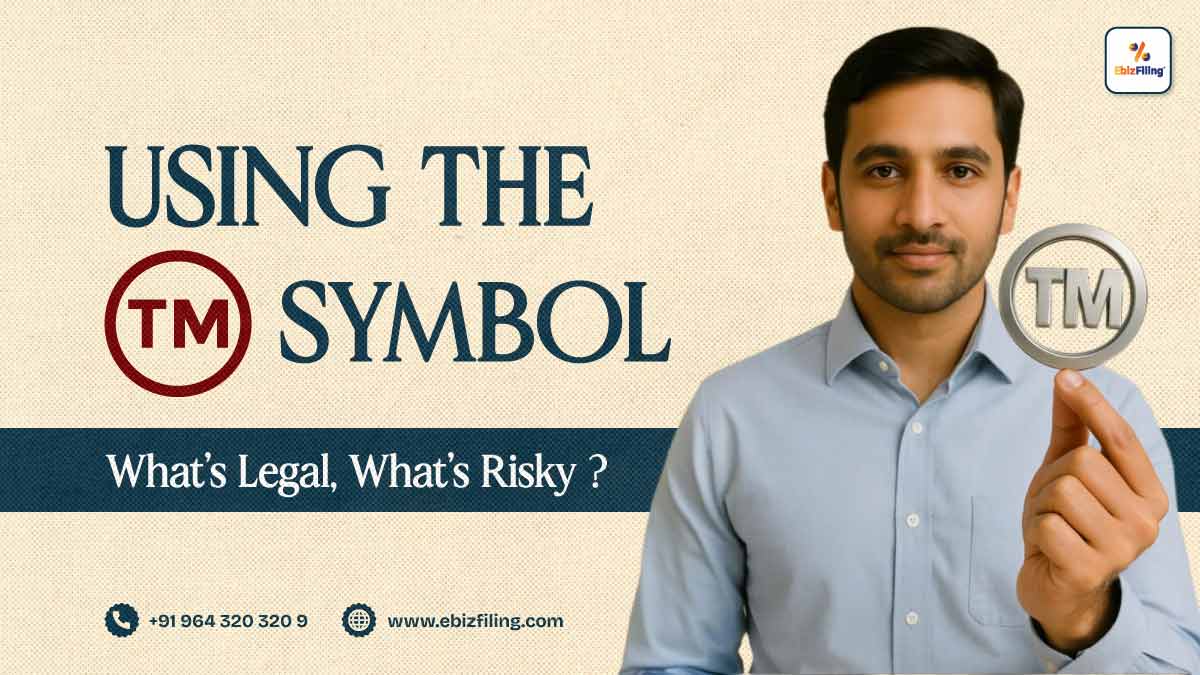
-
August 4, 2025
-
ByDhruvi D
Can You Use ™ Before Official Registration? Here’s What Indian Law Says
Introduction
You’ve just finalized your brand name. Maybe it’s a quirky podcast title, a YouTube channel name, or even your new product line. You’ve designed the logo, bought the domain, and announced it on Instagram. Now comes the question that stumps many Indian creators and entrepreneurs:
Can you legally use the ™ symbol even if your trademark isn’t officially registered yet?
Let’s break it down clearly; yes, you can use the ™ symbol even if your trademark isn’t officially registered yet. But like most things in law, there’s a bit more to it than just a simple yes.
What Does ™ Mean Legally in India?
Think of the ™ symbol as a flag. When you attach it to your brand name, you’re telling the world, “Hey, this name or logo is mine.” It’s not the same as having a registered trademark, but it signals your intent to claim ownership.
So, what does it mean when you see ™ next to a company name? It means the business believes it owns the mark—even if the Trademark Registry hasn’t officially approved it yet. It could be the name, logo, slogan, or even a product label.
In legal terms, using ™ shows that you’re in the process of claiming this identity, but it doesn’t automatically give you statutory rights.
Can TM Be Used Without Registering?
Yes, absolutely. Under Indian law, you don’t need to wait for a registration certificate to use the ™ symbol. You don’t even need to have applied yet.
But here’s the catch: using ™ doesn’t protect you legally if someone else registers your mark before you do. It’s a public claim, not legal ownership. You’ll still need to prove usage, distinctiveness, and ideally, show that you filed first.
If you’ve started using your brand publicly, it’s smart to file for trademark registration as soon as possible; and then use ™ with confidence.
What Is the Meaning of TM Registration?
When we say “TM registration,” we’re talking about the formal process of applying for a trademark under India’s Trade Marks Act, 1999.
Once registered, your brand enjoys nationwide protection. You also get the right to use the ® symbol, which signals to the world that your trademark is not just claimed—it’s legally recognised.
So while anyone can use ™, only those with an approved registration certificate can use ®.
What’s the Difference Between ™ and Registered (®)?
Here’s a quick side-by-side comparison between ™ and Registered (®):
| Feature | ™ Symbol | ® Symbol |
| Legal Status | Public claim of ownership | Official registration granted |
| Permission Needed? | No | Yes; only after approval |
| Enforceability | Limited; depends on proof of use | Strong; full legal backing |
| Penalty for Misuse | None | Misuse is punishable by law |
Using ™ is like putting a “Reserved” sign on your brand. Using ® is like getting the lease signed and stamped.
What Does the Law Say About Using ™?
According to India’s Trade Marks Act, 1999, only the ® symbol is legally restricted. That means using ® without official registration is an offense.
But there’s no such restriction on ™. You can use it at any stage; before filing, after filing, or while your application is pending. The law does not require approval for the ™ symbol.
Why Use ™ Before Registration?
You might wonder, if it doesn’t guarantee protection, why use it at all?
Here’s why many brand owners and creators choose to display ™ early:
-
To show intent to own: It tells others you’re serious about the brand.
-
To signal professionalism: Customers often associate ™ with legitimacy.
-
To discourage copycats: Even if it’s not registered yet, it can make people think twice.
Still, using ™ without filing is risky. It gives you no real legal ground if someone else applies before you. Filing your trademark strengthens your claim.
What Happens If You Use ® Before Registration?
Using the ® symbol without a valid trademark registration is punishable under Section 107 of the Trade Marks Act. It’s considered misleading the public and could lead to fines or legal action.
The bottom line: wait for your registration certificate before using ®.
When Can You Use the ® Symbol?
You can only switch from ™ to ® once:
-
Your application is examined and accepted
-
Any objections or oppositions are cleared
-
You receive your official Trademark Registration Certificate
Only then are you legally allowed to use the ® mark in India.
Risks of Using ™ Without Filing
Even though it’s legal to use ™ without applying, doing so isn’t foolproof. Here’s what can go wrong:
-
Someone else files before you and gets the registration
-
You may lose rights if you can’t prove consistent use
-
It weakens your legal position in a dispute
To avoid these issues:
-
File early: don’t wait for your audience to grow
-
Keep proof: emails, social posts, packaging, website screenshots
Conclusion: Play Smart with Your Trademark Symbols
Using the ™ symbol is legal in India; even before you register. It’s your way of saying, “This brand is mine.” But that alone won’t hold up if someone else registers before you.
So, be strategic:
-
Use ™ to claim your space
-
File early to protect it
-
Wait for registration before switching to ®
-
Never use ® without legal approval
Suggested Read :
How do you protect a phrase prior to filing for a Trademark?
7 Reasons Why You Need A Trademark Registration
FAQs on Trademark Registration in India
How to E-Register Trademark and Protect Your Intellectual Property?
FAQs: Using ™ and ® in India
1. Can I use the ™ symbol if I haven’t applied for a trademark yet?
Yes, you can use the ™ symbol even before filing. It’s allowed under Indian law as a way to claim brand ownership informally.
2. What does ™ mean when used next to a business or brand name?
It means the business is asserting informal rights over that name, tagline, or logo, even if it’s not officially registered yet.
3. Does using ™ give me legal protection?
Not automatically. It shows your intent but doesn’t provide statutory rights unless supported by actual use or a pending application.
4. When can I switch from ™ to ® in India?
You can use the ® symbol only after your trademark is registered and you’ve received the official certificate from the Trademark Registry.
5. Is it illegal to use ® before registration?
Yes. Using ® without a valid registration is considered a legal offense and may attract penalties under Indian trademark law.
6. Can I use ™ for both my logo and brand name at the same time?
Yes, you can use ™ for any brand elements such as, logo, name, or slogan, as long as it is original and intended to be claimed.
7. Is using ™ enough to stop someone from copying my brand?
It may discourage others, but it doesn’t guarantee legal protection unless supported by a trademark application or proof of prior use.
8. Does the Indian government monitor use of the ™ symbol?
No. The ™ symbol is not monitored or regulated by the government. It’s self-declared.
9. What if two businesses use the same name with ™?
In such cases, the one who files and registers the mark first usually has stronger rights and may challenge the other’s usage.
10. Does Ebizfiling help with trademark search and filing?
Yes. Ebizfiling offers trademark search, filing support, and guidance during examination or objection stages for creators and businesses.
Trademark Registration
Trademark Registration Made Simple and Secure with EbizFiling Today!
About Ebizfiling -










February 20, 2026 By Prachi C
50+ Small Business Ideas for 2026 Introduction. Starting a business today is easier than before because technology, online tools, and changing customer habits have created many new opportunities. Many Small Business Ideas can be launchedwith low investment and simple setups. […]
February 20, 2026 By Bhakti S
Top 10 CS Firms in India – 2026 updated list Introduction Company Secretary firms play an important role by helping businesses manage professional compliance and regulatory requirements. Without proper CS support, companies may struggle to meet statutory obligations under […]
February 20, 2026 By Steffy A
Best Income Tax Software for Indian Taxpayers Introduction Filing Income Tax Returns (ITR) is a mandatory annual task for Indian taxpayers and often a stressful one. As per the Income Tax e-filing portal guidelines, taxpayers must submit their ITR […]